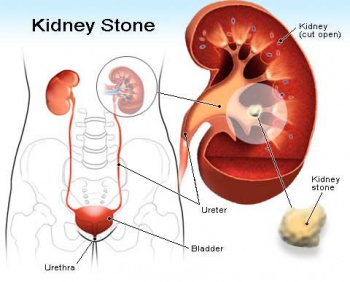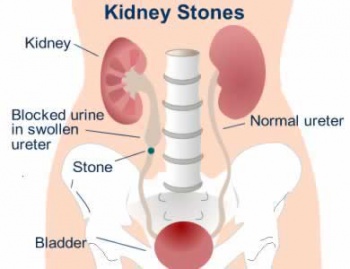Kidney Stones
From Health Wiki
Kidney Stones (renal calculi)
Contents |
Description & Causes
Kidney Stones are excessive accumulations of mineral salts which are initially formed in the kidney, but may lodge anywhere along the urinary tract. Calcium is the main component of these stones. When the calcium is filtered out of the blood by the kidneys, it conglomerates into a stone. Sometimes stone formation is due to overactivity of the parathyroid gland, which causes elevated levels of calcium in the blood.Some other conditions that increase the risk of kidney stone formation are dehydration, prolonged periods of bed rest, infections and rarely, overingestion of calcium.
Symptoms
Kidney Stone symptoms include pain starting in the middle of the back which radiates around the abdomen toward the genitalia, increased urination that may contain blood or pus, nausea and vomiting.
Irritation caused by a stone may create an infection in the urinary tract, which can be accompanied with fever, chills and general discomfort.
Prevention & Treatment
Therapy through diet cannot remove already formed Kidney Stones. However, prevention of further stone formations is possible by limiting the intake of calcium. Since a deficiency of vitamin B6 and magnesium may cause these formations, adequate intake of these supplements is crucial. Also, people whose diets are deficient in vitamin A, have a tendency to form this problematic gravel.
Following are some vitamins and nutrients that may be beneficial in the treatment of Kidney Stones:
- Vitamin A
- Vitamin B6
- Vitamin C
- Vitamin E
- Vitamin K
- Magnesium
- Calcium (restricted intake)
- Lecithin
- Potassium Citrate
- Lemon Juice
- Citrus Juice (orange, lime)
- Coffee
- Black Currants
- Cranberries
Helpful Herbs
Here are some of the herbs that are effective in the treatment and prevention of Kidney Stones:
- Agrimony
- Cornsilk
- Fennel
- Hydrangea
- Marshmallow
- Nettle Leaf
- Parsley
- Juniper
- Queen of the Meadow
- Rose Hips
- Uva Ursi
- White Oak Bark
Related Discussions
- Magnesium May Prevent Gallstones
- Study finds bacteria may reduce risk for kidney stones
- Calcium Oxalate Kidney Stones
- Kidney Detox
- Cranberries - A Scientific Review

